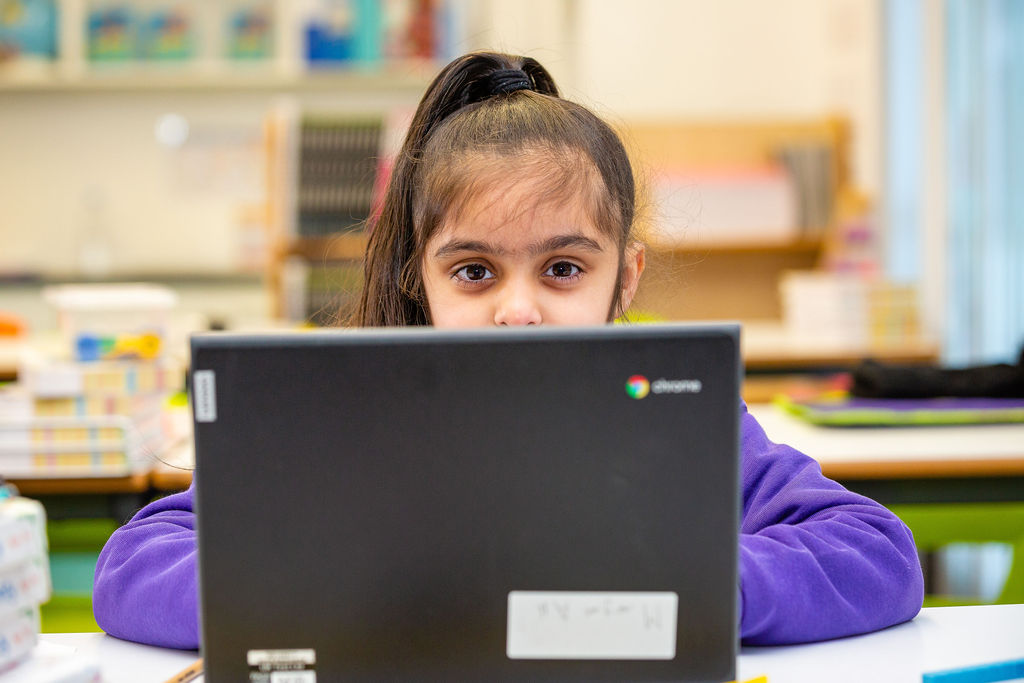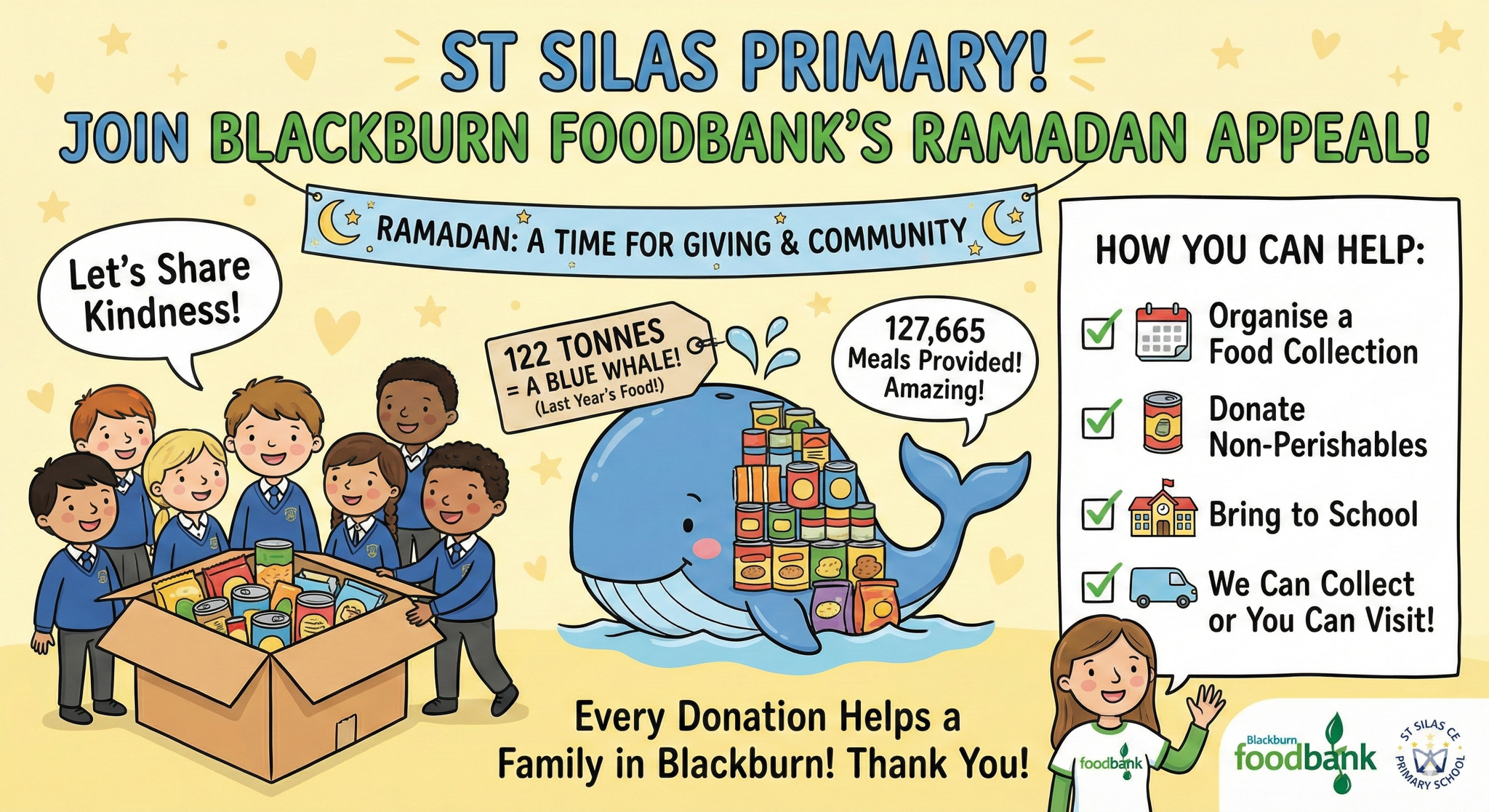Why do we teach Computing?
At St Silas Primary School, we understand the immense value that technology plays not only in supporting the Computing and the whole school curriculum but overall in the day-to-day life of our school, in the lives of our children at home and in the lives of their families. Computers are part of our everyday life and for most of us, technology exists in most aspects of our lives and our aspiration is for the children at St Silas to be ready for the computing they will have to do in their next stage of learning and then later on in their workplace. In effect, they must be able to participate seamlessly in the digital world.
Our aims are to fulfil the requirements of the National Curriculum for Computing whilst also providing enhanced collaborative learning opportunities.
Computing teaching has in the past had ties with Mathematics, Science and Design and Technology, but now it is inextricably linked to all areas of the curriculum. Our aim is to ensure that pupils become digitally literate and digitally resilient. Technology is ever evolving and we aim to develop pupils who can use and express themselves, develop their ideas and use information and communication technology at a suitable level for the future workplace and as active participants in our digital world.
In Computing we aim to
- Provide a broad, balanced, challenging and enjoyable Computing curriculum for all pupils.
- Develop pupil’s computational thinking skills that will benefit them throughout their lives.
- Meet the requirements of the national curriculum programmes of study for computing at Key Stage 1 and 2.
- To respond to new developments in technology.
- To equip pupils with the confidence and skills to use digital tools and technologies appropriately and effectively throughout their lives.
- To enhance and enrich learning in other areas of the curriculum using developing technologies and computing.
- To develop the understanding of how to use computers and digital tools safely and responsibly.
We also aims to ensure that pupils:
- Can understand and apply the fundamental principles of computer science, using data representation and programmable devices.
- Can analyse problems in computational terms, and have repeated practical experience of writing computer programs in order to solve such problems
- Can evaluate and apply information technology, including new or unfamiliar technologies, analytically to solve problems.
- Are safe, responsible, competent, confident and creative users of information and communication technology.
- Understand and follow the online safety guidelines and messages that can keep them safe online.
- Know who to talk to if they have concerns.
- Apply their learning in a range of contexts, e.g. at school and at home.
In our Computing and our Online Safety lessons the children will learn about a range of British values such as:
- The legal implications of following civil and criminal law
- Downloading music/film from ‘free’ sources
- Posting offensive/slanderous material on social media
- Cyber-bullying
- Hacking
- Protection of data and using privacy settings
- Appreciating the viewpoints of others on ethical issues
- How to be a respectful digital citizen
- Ensuring all student’s work and views are appreciated through online collaboration tools such as those found in the Google Classrooms
- How to select information from valid online sources
- The value of blogs to understand different viewpoints on a range of topics
Children are also taught about:
- How to use the internet positively (including social media)
- How to leave a positive digital footprint and impact this has on their lives including the years to come
- The dangers of the internet are highlighted to students and they are taught about what to do if they are uncomfortable with any online behaviour or material they see.
How do we teach Computing?
To ensure we teach computing to a high standard, we use a specialist teacher provided by Junior Jam. In addition skills from computing are used and practised across the whole curriculum.
What do we teach?
Computing is a foundation subject in the National Curriculum and at St Silas Primary School, implementation of the computing curriculum is in line with 2014 Primary National Curriculum requirements for KS1 and KS2 and the Foundation Stage Curriculum in England. This provides a broad framework and outlines the knowledge and skills taught in each key stage.
Computing Knowledge Organisers
Some of the Computing software that we use across the wider curriculum can be found below:
- PurpleMash - 2 Simple Applications
- 2Code
- Code.org
- Scratch
- Scratch Junior
- Google Docs
- Google Sheets
- Google Slides
- BeeBot
Computing in EYFS
The following statements and early learning goals detail the learning outcomes which the children work towards during reception.
Within the 30-50 months section pupils:
- Know how to operate simple equipment e.g. turns on a device and uses a remote control.
- Shows an interest in technological toys with knobs or pulleys, or real objects such as cameras and mobile phones.
- Shows skill in making toys work by pressing parts or lifting flaps to achieve effects such as sound, movement or new images.
Within the 40-60+ month section pupils:
- Complete a simple program on a computer.
- Uses ICT hardware to interact with age-appropriate computer software.
- Early Learning Goal: Children recognise that a range of technology is used in places such as homes and schools. They select and use technology for a particular purpose
Assessment
Our specialist teachers assess our children and reports to our teachers.
Message from the Subject Leader
My name is Mr Hadwin and I am the subject leader for Computing. Prior to joining St Silas Primary School, I worked as a computing/e-learning advisor for Blackburn with Darwen Local Authority, so I have a great deal of expertise in teaching computing. This work involved working with all the schools (secondary, primary and special) in Blackburn and Darwen to increase their use of new technologies in all aspects of teaching and learning. I have maintained this technological role in school and was in charge of a successful Remote Learning response of our school to the Coronavirus Pandemic. The St Silas staff were able to deliver live lessons to the entire school population. Furthermore, I am proud to be able to say that we were able to lend over 100 devices to children who would otherwise not have been able to access our live lessons. I am incredibly interested in technology, its use in education and I enjoy witnessing the impact that it has on the lives of our children. At school I teach, train and upskill the children and staff in computing.
Support for Parents
We are fortunate that many of our parents are more than willing to contact the school if they need help for their children with Computing. All children have their own accounts with Google Classroom and Purple Mash. St Silas have worked extremely hard to ensure that our children have access to the resources they need to help them in their learning.
Some of the websites and resources that the children use for computing are listed below:
www.purplemash.com (this includes Mini Mash for EYFS)
www.google.com (Google Suite, Google Classroom)
https://scratch.mit.edu/ (a computer coding resource)

